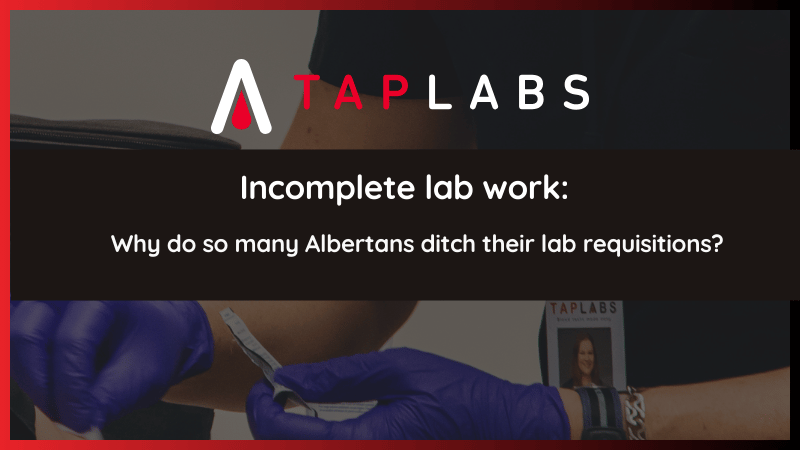Incomplete lab work: Why do so many Albertans ditch their lab requisitions?

Medical laboratory testing is one of the first lines of defence protecting a patient’s health and well-being. It plays a crucial role in the early detection and diagnosis of disease and informs treatment plans that improve a patient’s quality of life.
The benefits of lab data are clear. But a recent study of the Chinook Primary Care Network in Alberta found that over the course of a year, only half of the lab requisitions issued were completed within two weeks — and almost a third were abandoned altogether.
Dr. Paul Kuzel, physician and co-founder of TapLabs, shares what he sees as the barriers to completing lab work and a way physicians can help get the process across the finish line.
Common reasons for abandoned requisitions
Dr. Kuzel knows there are many reasons why patients don’t action requisitions. Patient anxiety, time constraints and the distance to the nearest lab are the most common ones he’s encountered in both his dermatology practice and his work with TapLabs.
Needle anxiety
According to Dr. Kuzel the rate of needle phobia in patients is as high as 60 percent. Fear of needles is very common in children and youth (click here for TapLabs tips to achieve tear-free pokes), but Dr. Kuzel knows that the problem isn’t limited by age. “Most patients, to some degree, get stressed out by the prospect of a needle poke,” he says.
Experiences vary, but even a little bit of anxiety around blood draws may lead to a patient avoiding the lab, especially when additional barriers are added to the mix.
Time investment
People are busier than ever. Juggling careers, social lives, parental responsibilities and a global pandemic can leave little time to commute to and wait in a crowded lab.
And because labs are only open during business hours, receiving a lab requisition can mean time off work or finding child care. In some cases, patients are also dealing with limited mobility or are immunocompromised, adding new layers of difficulty.
Dr. Kuzel adds that in dermatology, as with other specialties, there are patients who need blood work done more often.
“It's one thing if you have a lab requisition to be completed once a year as part of your annual physical,” he says. “But what if you're on medication that requires monthly or even weekly blood work monitoring? And what if you have a chronic medical condition that requires similar frequency? It can become really prohibitive for people.”
Even the time and energy it takes to navigate the online booking system to schedule an appointment can deter patients from following through, says Dr. Kuzel.
Distance of lab
There are 22 Calgary Laboratory Services locations in the city. According to a study published in 2015, those labs are more concentrated in Calgary’s central areas, with the peripheral areas being proportionately underserved.
The study also found that the average Calgarian’s travel distance to the nearest lab is 12.49 kilometres. Depending on the patient’s mode of transportation, the distance to a lab from their home or workplace can present another barrier.
What can physicians do?
All these reasons are why Dr. Kuzel co-founded TapLabs. Patients can book an appointment on their user-friendly app and a lab technician will travel to their home or workplace to have their lab collection completed in a familiar setting.
TapLabs sends only the most highly experienced phlebotomists who are specifically skilled in drawing blood from needle-phobic patients. They book half-hour appointments for each patient visit, so there’s no busy waiting room or lab building to navigate.
Dr. Kuzel says many physicians may not realize that mobile lab service is an option for their patients. But with lab requisitions continuing to be abandoned in Alberta, and the importance of lab data for patient health, Dr. Kuzel hopes more physicians will consider mobile services that could remove barriers to care.
“Giving patients an option when there is no other option is a much better alternative than if patients don’t complete their blood work at all,” he says.
Find out more about TapLabs mobile lab services.
Let's Connect
Need assistance or ready to book? Send us a message, and our team will get back to you shortly.


